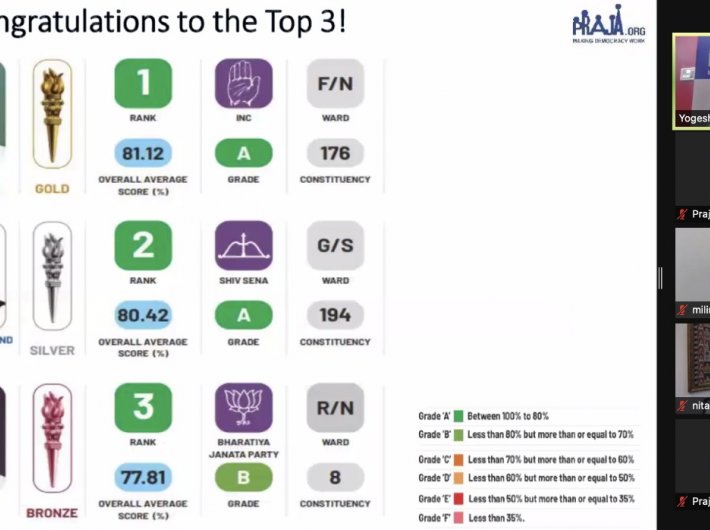NGO Praja Foundation’s report for 2017-2021 has only 22 of 220 counsellors getting A, B grades
Citizens’ complaints are one of the most important aspects of a councillor’s responsibilities to take up with the municipal corporation. Unfortunately for Mumbai’s citizens 219 (99.55%) out of 220 councillors did not prioritize citizens’ complaints and issues when asking questions, according to Praja Foundation’s Municipal Councillors Report Card for the period April 2017—March 2021.
Only 22 (10%) out of 220 total councillors have been graded A and B and 90% (198) have received C, D, E and F grades in the overall performance, underlining the need for major improvements in performance. None of the councillors achieved an A grade in terms of the quality of questions asked.
The Consolidated Report Card assesses the performance of councillors from 2017-18 to 2020-21 as the NGO has not been able to publish its regular annual report card.
Ravi Kondu Raja of INC has been ranked no. 1 achieving a performance score of 81.12%, followed by Samadhan Sadanand Sarvankar of Shiv Sena at no. 2 (80.42%) and Harish Ravji Chheda of BJP at 3rd rank with 77.81% score. The worst performing counsellors are Gulnaz Mo. Salim Qureshi of AIMIM with 22.49% score, Sagar Ramesh Singh of BJP with 27.18% score and Parmeshwar Tukaram Kadam of Shiv Sena with a score of 28.12%.
Overall, the counsellors’ performance has remained stagnant at 55.10% during the period under review. Thirty councillors did not ask a single question in various meetings held. Gulnaz Mo. Salim Qureshi (AIMIM - H/E ward) did not raise a single question in the period.
Party wise, the average scores of INC councillors’ performance was the highest at 57.21%, followed by Shiv Sena at 55.88%, SP at 55.05%, BJP at 55.01% and NCP at 51.78%.
The report card also point out that as the term progresses, councillors’ attendance comes down: from 81% in 2012-13 to 69% in 2014-15 and in the current term it has dropped from 82% in 2017-18 to 74% in 2019-20.
In the initial months of the lockdown, deliberations had come to a halt and they started a few months later using technology. From April 2017 to March 2020, an average of 24 ward committee meetings were conducted every month. On the other hand, in October-December, 2020, when the ward committees started meeting online, the average number of meetings increased to 28 meetings a month.
From April 2017 to March 2021 ward committees met 21 times, statutory committees met 32 times and general body meetings were held 7 times a month. Praja recommends that pandemic or otherwise, technology should be used for effective qualitative discussions and the total number of meetings should be increased by leveraging telecommunications software.
It says that in Mumbai, currently there are 24 wards and only 17 ward committees. Increasing the number of committees to match the total number of wards can enable effective ward-wise deliberation leading to higher number of issues raised, quicker resolution of the constituents’ problems. Additionally, the administration also needs to work in sync with corporators for effective deliberation and problem resolution.
“MCGM’s recent decentralisation of Covid management at the ward level by creating ‘Covid War Rooms’ in all 24 wards exhibited that citizens’ issues can be managed effectively and efficiently at a local level and that is where councillors play an important role. During the initial months of the lockdown in 2020, the councillors were actively involved on the field to firefight the onslaught of Covid-19. MCGM and other individual organisations were also working hand in hand to provide immediate relief to those in need. However, what is necessary is for the system to respond in a coordinated and sustainable manner. This can only happen when the deliberative wing meets on a regular basis and is able to regularly hold our government accountable for its actions,” said Milind Mhaske, Director, Praja Foundation.
He added that for efficient running of the committees and to be able to address citizens’ issues in a systematic and efficient manner we need more councillors to transition to A, B, C and D grades while completely eliminating E and F grades of performances.
“With MCGM elections round the corner, we need to understand how our current elected representatives have performed in the last term. Praja Foundation’s Municipal Councillors Report Card can act as an opportune moment to introspect on the performances,” said Nitai Mehta, founder and managing trustee, Praja Foundation.

